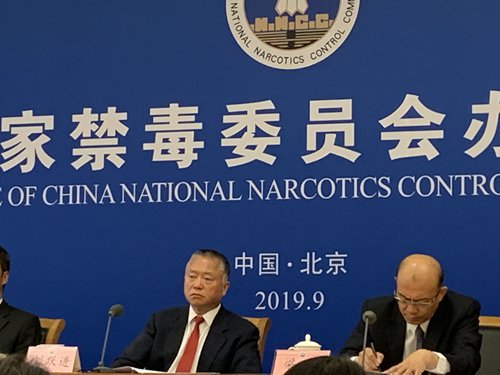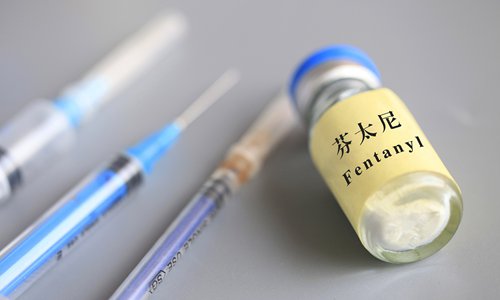HOME >> CHINA
Ministry urges US to stop slandering China over its own opioid problem
By Zhao Yusha Source:Global Times Published: 2019/9/3 14:28:40 Last Updated: 2019/9/4 0:53:05
Fentanyl accusations sign short of pressuring tool in trade negotiations

Liu Yuejin (left), deputy director of the National Narcotics Control Commission, at a press conference held in Beijing on Tuesday. Photo: Zhao Yusha/GT
A senior official from China's Ministry of Public Security urged the US to stop slandering China for its own fentanyl problem, saying that the US has its own culture, policies and companies to blame for the crisis.
Liu Yuejin, deputy director of the National Narcotics Control Commission, said at a press conference on Tuesday that China is making extensive efforts toward regulating the opioid fentanyl and slammed US rumors that China is the main source of the opioid crisis in the US.
China has not found a single case of fentanyl smuggling and manufacturing since it enhanced restrictions on May 1, when all fentanyl-related analogs were added to the country's list of controlled drugs, said Liu.
In recent years, the US has claimed there is evidence that fentanyl has been illegally smuggled out of China and is a major source of the opioid, according to US news reports.
Liu said the increased restrictions on access to fentanyl in China and the rising number of deaths in the US indicate that China was never a major source of fentanyl in the US.
US law enforcement departments reported that from October 2018 to March 2019, 536 kilograms of fentanyl substances were seized and only 5 kilograms came from China. Authorities made 229 fentanyl busts during that period and only 17 involved Chinese smugglers.
Liu said that although China and the US have cooperated on fighting drug smuggling in recent years, the countries have jointly solved only a limited number of fentanyl cases.
The US has provided Chinese authorities with only six tips relating to illegal fentanyl smuggling in China since 2012, said Liu.
Liu also slammed accusations that fentanyl substances from China arrived in the US via Mexico, saying law enforcement departments in those two countries have not provided evidence to support the accusation.
"People in the US should not make statements before they examine the facts," Liu said.
US hype
At the press conference, Liu provided a vivid example of how the US was disseminating fake news and blaming China for its own fentanyl problems.
Mexican government authorities reported a seizure of approximately 25.75 tons of powdered fentanyl in the port city of Lázaro Cárdenas, which came from China, Mexican media Excelsior reported last week.
After the news was published, the US Office of National Drug Control Policy (ONDCP) re-tweeted the news saying that "China continues to pour poison into our communities…FINAL DESTINATION: USA."
Law enforcement departments from China, the US and Mexico conducted emergency communications and found the substance was not fentanyl, but other chemical products, said Liu.
Excelsior deleted the report, but the ONDCP has not yet deleted its tweet.
Liu urged the US to set aside prejudice and cooperate with other countries to crack down on crimes relating to illegal fentanyl smuggling, rather than smugly pointing fingers and tarnishing another country's reputation.

Photo: IC
At the conference, Liu also raised another example of some US media reports that three Chinese nationals were sanctioned by the US government in late August, accused of trafficking synthetic opioids.
Sigal Mandelker, under secretary for Terrorism and Financial Intelligence, later said the three were "directly contributing to the crisis of opioid addiction, overdoses, and death in the US."
Liu said that the US is making a fuss about the cases to achieve their own political agenda.
The cases were co-handled by Chinese public security bureaus and the US drug enforcement agencies, so both sides had a clear picture of the process, Liu noted.
China has not yet regulated all fentanyl-related analogs by the time of their arrests and so their behavior was not illegal and the Chinese government had no legal right to hold them accountable, said Liu.
The US announcement of its latest sanctions for the three individuals came weeks after President Donald Trump accused China of not doing enough to stop the drug from entering the US in early August
"The US recently intensified accusation of China's 'insufficient effort' on tackling fentanyl problem also serves the political purpose of the Republican, who prioritizes dealing with drug problems in its agenda," Diao Daming, a US studies expert and an associate professor at Renmin University in Beijing, told the Global Times on Tuesday.
Diao said that with the looming 2020 presidential election, Trump's slandering of China over fentanyl also serves to divert domestic attention from his failure to deal with drug problems within the US.
The US fentanyl abuse problem is rooted in its tradition of using fentanyl substances, said Liu, citing statistics that the US population, which accounts for only 5 percent of world's population, consumes 80 percent of all opioids.
Liu said US profit-driven drug makers, who sponsor experts to publish research saying that opioids are harmless, should also be held accountable for the country's opioid crisis.
The other reasons included the US governments' loose regulation of opioids and the US cultural background, which relates taking drugs to liberty and individualism.
When asked to respond to Trump's connection of China's battle against fentanyl with the two countries' ongoing trade negotiations, Liu said that although China had been working closely with the US on curbing the illicit flow of the substances, such efforts were "totally irrelevant" to the trade negotiations and the two issues "should not be mixed together."
Diao said connecting fentanyl with the trade negotiations indicated that the US was trying to use it as a bargaining chip in trade negotiations with China.
The two things are totally irrelevant and the US understands China's determination to crack down on fentanyl problems, he said, noting forcibly bringing the two issues together shows the US is already running out of methods to pressure China.
Intensified efforts
At the Tuesday conference, officials introduced other measures China is taking to regulate fentanyl substances, such as deleting fentanyl-related information from websites and ending online distribution of fentanyl.
Customs departments have also intensified their efforts to examine goods coming in and out of China.
To better regulate fentanyl substances, the Ministry of Public Security has invested more than 6 million yuan ($0.89 million) in building one national center and five sub-centers to test and research fentanyl substances, said Liu.
Except for regulating fentanyl substances, government bodies including customs and postal departments also contrived to snuff out fentanyl inside and outside the country.
For instance, the customs authorities deployed high-tech equipment such as a millimeter wave body scanner to examine cargo and passengers, Ma Jun, a senior official from the General Administration of Customs, said at the conference.
The ministry, along with the Supreme People's Procuratorate and the Supreme People's Court, has mapped out three laws to regulate fentanyl-related crimes, which will be published in the near future.
Posted in: SOCIETY